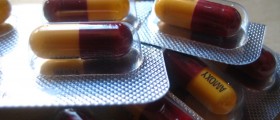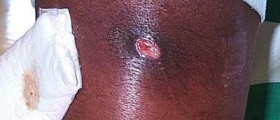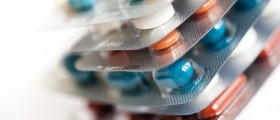
Penicillin is a group of antibiotics derived from the Penicillium fungi. Penicillin is effective against bacterial infections as it kills bacteria by interfering with the ability to synthesize cell wall. It was historically important discovery, as it was the first drug effective against many previously serious diseases such as syphilis and Staphylococcus infection.
Before the discovery of penicillin, death could occur in what would seem, today, to be very trivial injuries and diseases. Minor infected wounds or inflammation of the throat were once more serious ailments than today. However, most of the bacteria are nowadays resistant to penicillin, but it is still widely used.
Penicillin VK
Penicillin VK is used to treat various infections such as dental infections, middle ear infections, rheumatic fever, scarlet fever, skin infections, infections in the heart and upper and lower respiratory tract infections. Penicillin VK is effective against bacteria and it works the best if patient takes it on empty stomach. It is important to take a full treatment and never miss a dose. Penicillin VK should be measured with a calibrated measuring spoon. If a patient forgets to take a prescribed dose, he should take the next one as soon as he remembers. If patient remembers almost in time for the next dose, he should take a double dosage.
There are some side-effects associated with penicillin VK and they usually include anemia, black hairy tongue, diarrhea, fever, hives, nausea, skin eruptions, stomach upset or pain, swelling in throat, and vomiting. If any of the strange symptoms is present, patient should warn doctor as soon as possible.
Penicillin G
Penicillin G is used in the form of injection to treat and prevent infections caused by bacteria. Before doctor prescribes penicillin G, the appropriate culture and susceptibility tests should be done in order to isolate micro-organisms causing the infection and determine their susceptibility to penicillin G.
Penicillin G is used to treat inflammatory processes caused by bacteria in lungs, liver, muscles, bones placenta and kidney. It is also effective in treatment of meningitis and various infections of the heart.
Penicillin G is associated with serious side-effects that may sometimes be fatal. Side-effects may include severe anaphylactoid reactions. Penicillin G is to be used with caution in patients with history of allergies or asthma.
Other side effects of penicillin
Other side-effects associated with penicillin include the decreased effectiveness of birth control pills, lowering the levels of useful bacteria in the digestive tract, nausea and stomach pains, vaginal itching and unpleasant discharge. Dangerous penicillin side effects may also include severe skin rashes, itching and peeling of the skin.
Some of the side effects may be psychological and they include a confused state of mind with an increase in anxiety and nervousness.

















Your thoughts on this
Loading...